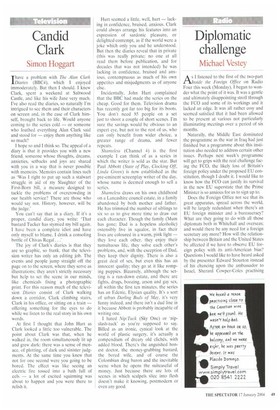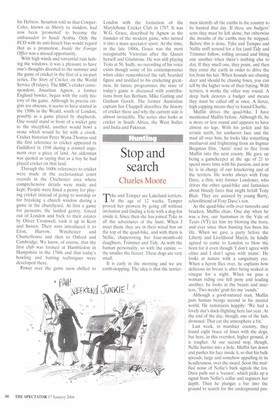Diplomatic challenge
Michael Vestey
As, I listened to the first of the two-part nside the Foreign Office on Radio Four this week (Monday), I began to wonder what the point of it was. It was a gentle and ultimately disappointing stroll through the FCO and some of its workings and it lacked an edge. It was all rather cosy and seemed satisfied that it had been allowed to be present at various not particularly illuminating meetings over a period of six months.
Naturally, the Middle East dominated the programme as the war in Iraq had just finished but a programme about this institution also needed to address certain other issues. Perhaps next week's programme will get to grips with the real challenge facing the ECG, the likely loss of Britain's foreign policy under the proposed EU constitution, though I doubt it. I would like to know how the FCO can justify its survival in the new EU superstate that the Prime Minister is so anxious for us to sign up to.
Does the Foreign Office not see that its great apparatus, spread across the world, will be largely redundant when there's an EU foreign minister and a bureaucracy? What are they going to do with all those diplomats both in Whitehall and overseas; and would there be any need for a foreign secretary any more? How will the relationship between Britain and the United States be affected if we have to observe EU foreign policy with its anti-American bias? Questions I would like to have heard asked by the presenter Edward Stourton instead of his chancing upon the ambassador to Israel, Sherard Cowper-Coles practising his Hebrew. Stourton told us that CowperColes, known as Sherry to insiders, had now been 'promoted' to become the ambassador to Saudi Arabia. Only the FCO with its anti-Israeli bias would regard that as a promotion. Inside the Foreign Office was a missed opportunity.
With high winds and torrential rain lashing the windows, it was a pleasure to have one's thoughts diverted to the summer and the game of cricket in the first of a six-part series, The Story of Cricket, on the World Service (Fridays). The BBC's cricket correspondent, Jonathan Agnew, a former England bowler, began with the early history of the game. Although its precise origins are obscure, it seems to have started in the 1500s in the Weald, south of London, possibly as a game played by shepherds. One would stand in front of a wicket gate to the sheepfold, another would bowl a stone which would be hit with a crook. Cricket historian Peter Wynn-Thomas said the first reference to cricket appeared in Guildford in 1598 during a council argument over a piece of land. An alderman was quoted as saying that as a boy he had played cricket on that land.
Through the 1600s references to cricket were made in the ecclesiastical court records in the Chichester area where comprehensive details were made and kept. People were fined a penny for playing cricket instead of going to worship or for breaking a church window during a game in the churchyard. At first a game for peasants, the landed gentry, forced out of London and back to their estates by Oliver Cromwell, took it up in Kent and Sussex. Their sons introduced it to Eton, Harrow, Winchester and Charterhouse and then to Oxford and Cambridge. We know, of course, that the first club was formed at Hambledon in Hampshire in the 1760s and that today's bowling and batting techniques were developed there.
Power over the game soon shifted to London with the formation of the Marylebone Cricket Club in 1787. It was W.G. Grace, described by Agnew as the founder of the modern game, who turned it into a mass spectator sport. At the time, in the late 1800s, Grace was the most recognisable Victorian after the Queen herself and Gladstone. He was still playing Tests at 50. Sadly, no recording of his voice exists though some of his contemporaries when older remembered the tall, bearded figure and testified to his cricketing greatness. In future programmes the state of today's game is discussed with contributions from Ian Botham, Mike Gatting and Graham Gooch. The former Australian captain Ian Chappell describes the history of cricket there and why the current side is almost invincible. The series also looks at cricket in South Africa, the West Indies and India and Pakistan.



































































 Previous page
Previous page